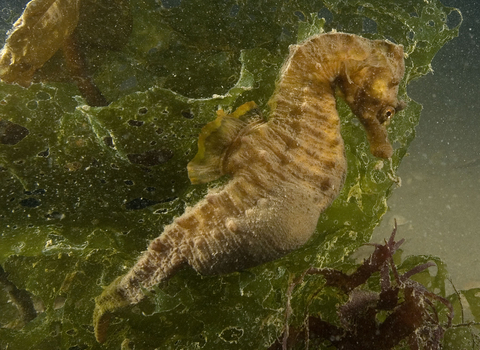
Short-snouted seahorse ©Paul Naylor www.marinephoto.co.uk
Short-snouted seahorse
One of 2 seahorses found in UK seas, short snouted seahorses are recognisable by their shorter snout - surprisingly enough!
Scientific name
Hippocampus hippocampusWhen to see
January to DecemberSpecies information
Statistics
Length: 15cmThe short snouted seahorse is currently unlisted on the IUCN Red List due to deficient data (DD), but was previously listed as Vunerable (VU). In the UK, it is a Priority Species under the UK Post-2010 Biodiversity Framework and protected under the Wildlife and Countryside Act 1981. They are a Feature of Conservation Importance for which Marine Conservation Zones can be designated.
